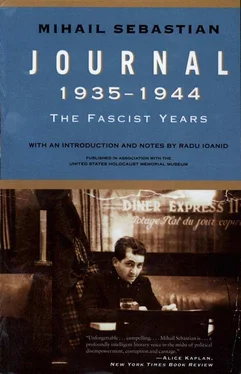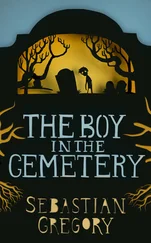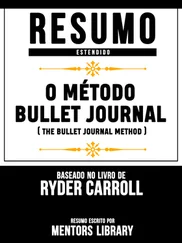Then my house was bombed. I rang up to say what had happened, and haven’t set foot there since. Later I informed them through Belu that I was pulling out for good.
Bewilderment, fear, doubt. Russian soldiers who rape women (Dina Cocea told me yesterday). Soldiers who stop cars in the street, order the driver and passengers out, then get behind the wheel and disappear. Looted shops. This afternoon three of them burst into Zaharia’s, rummaged through the strongbox, and made off with some watches. (Watches are the toys they like most.)
I can’t treat all these incidents and accidents as too tragic. They strike me as normal — even just. It is not right that Romania should get off too lighdy. In the end, this opulent, carefree, frivolous Bucharest is a provocation for an army coming from a country laid waste.
Toward evening an order printed in Russian and Romanian, on sheets of paper the size of a cinema program, imposed a nine o’clock curfew and instructed everyone to hand in their radios.
They seem like standard texts drawn up before the 23 rd of August, which have not been revoked as a result of the new situation. Probably everything will be explained soon enough.
In the end, the Russians are within their rights. The locals are disgusting — Jews and Romanians alike. The press is nauseating: Mircea Damian, Cristobald, and so on. 1
This morning I made the stupid mistake of going to Dorian’s, 2where I had been invited to a “writers’ conference.” I helplessly witnessed the constitution of “the Union of Jewish Writers,” with Benador, 3Călugăru, 4and Dorian at its head. Unknown figures, nonentities — a mixture of desperate failure, thundering mediocrity, old ambitions and troubles, all drawing fresh life from impudence and ostentation.
I won’t forgive my cowardice at not having shouted out all they deserved to hear. But that’s the last time I let myself be caught in such snares.
Without a home, I feel things as provisional. It is as if I were in a strange city, on a platform between two trains.
I have no books and no working hours. I don’t know where to find people who might interest me — and they certainly don’t know how to find me.
I am exhausted and unoccupied.
I went to the cinema this afternoon. A Soviet film had been billed at the Scala, but there were no tickets for the four o’clock show. So I went to the Aro to see Intermezzo again after all these years, with Leslie Howard and Ingrid Bergman.
What a pleasure it was to hear and understand English; to see a film so technically subtle and accomplished. All the German and Italian wares were good for nothing. How human is Leslie Howard, how decent in his humanity!
On the way out I passed the Scala again and this time found rear balcony seats for Benu and myself at six o’clock.
The newsreel was fascinating. It showed a parade of German prisoners in Moscow. Huge columns of tired, dirty, shabby animals, with nothing recognizable from the sportily provocative elegance of the Hitlerite troops who paraded in Bucharest. Troglodyte faces, as if taken from anti-Semitic or anti-Bolshevik propaganda photos in Das Reich. How easy it is to turn a human face into an animal’s! Those clean-shaven, well-dressed, bathed, groomed, and polished young men, who used to reside at the Ambassador Hotel, did perhaps sincerely believe that the Jews lying in mudheaps and pools of blood in Poland and Transnistria were a lower species of dog that anyone could shoot with impunity.
How stunned, how humble were the German generals in today’s film, as they marched between bayonets at the head of the column!
In that one vengeful image you can see the reality of victory.
The main feature was a film with a war theme: naive, rather crude and childish. Mais le coeur y est. 5
This morning I saw a small Soviet tank chasing a private car with intent.
The street incidents continue. Passersby are jostled until they hand over their watch. The watch seems to be the Russian soldier’s idée fixe.
Yesterday’s order appeared in all today’s papers: a nine o’clock curfew; radios to be handed in. It’s not a very clear sign of freedom — and people will find it hard to understand. But if it proves a lesson for Romanians, who spent four years pillaging the Jews, then it won’t do any harm.
Still the same wearying impression that things are provisional. I am out and about all day — even I don’t know why. I desperately rush around looking for somewhere to live, hesitating between all kinds of “solutions” that would not actually solve anything. Should I repair the apartment in Strada Antim? Should I wait for the Basdevants to leave, and take over theirs?
The complications will grow with each day that passes. For the moment I have some money, but its value is falling all the time. Inflation and devaluation will be catastrophic. With the ruble at one hundred lei, and with thousands of soldiers who buy anything (when they don’t pillage) and pay any price, money no longer means anything.
If I had a house like everyone else, I would find the spectacle interesting. After all, hunger might not kill me. But with my present sense of living in the street, everything is becoming too uncertain.
Camil Petrescu, pale and scared, has naively fastened onto Belu and myself. I feel sorry for him. He is cracking up with fear. He would like to make some demonstration, justify and protect himself. Others, no less “fascist” than he, have the nerve to make a profession of democratism and intransigence. But poor Camil tries to exculpate himself. That is what he has always done — under Carol II, under the Legionaries, and under Antonescu.
I met Cocea by chance.
“You brought the Germans here,” he shouted at me, “you Cuvântul people.”
“No, it was you who worked with the Hitlerites,” I replied in the same coin.
It had an impact. He was fuming, in quite a state. I may have made myself an enemy.
But I’ve had enough of that, for God’s sake! Will I be “one of the Cuvântul people” till the end of my life?
I’d like to write my book about the war — fast, so as to get it off my chest and calm down.
It amuses me that one of the phrases I composed for the manifesto of the National-Democratic Bloc—“History makes no gifts”—is making a career for itself. When I wrote those four words I didn’t know that I was giving birth to a historical judgment. The phrase has been taken up by Radio London. Universul has written a whole commentary under the same title. And yesterday I read in Semnalul: “History, a great Romanian statesman said recently, makes no gifts.”
Yesterday at the cinema, a film about the war in Ukraine. The horror exceeds everything. Words and gestures are no longer of any avail.
These Russian soldiers who walk the streets of Bucharest, with their childlike smile and their friendly churlishness, are real angels. How do they find the strength not to set everything on fire, not to kill and plunder, not to reduce to ashes this city that houses the mothers, wives, sisters, and lovers of those who killed, burned, and laid waste their country?
Only the total extermination of Germany could, in the ideal scales of justice, make up for all or at least part of what happened.
I had lunch with Carandino at the Capşa, where he had asked me to come and talk about “business.”
Читать дальше











